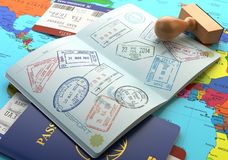Indore’s Devi Ahilyabai International Airport has started accepting electronic visas for India (e-Visas), fulfilling a long-standing demand from travelers. The move, announced by Shankar Lalwani, the representative for the Bharatiya Janata Party for Indore Lok Sabha, is expected to streamline the entry process for foreign visitors and boost tourism. “I am happy to inform you
Visa Policy for India
India’s visa policy outlines the requirements, rules, and regulations for foreign nationals traveling to the South Asian country.
The vast majority of visitors from abroad require a visa for India. There are different types of visa available, depending on the nationality of the traveler, the length of time they plan to stay in the country, and the purpose of the visit.
The electronic visa or e-Visa for India is available for the majority of nationalities. It can be obtained by completing a simple online application form. The India e-Visa is processed quickly and delivered to the applicant by email.
Three types of e-Visa for India exist: the India Tourist e-Visa, the India Medical e-Visa, and the India Business e-Visa. Each of these permits foreign nationals to stay in India for a short period of time for the specified purpose.
Citizens of a number of countries are not able to apply online and must obtain a visa from an Indian embassy instead.
Indian embassy visas and permits are also available for foreign nationals who wish to relocate to India, work or study in the country, or stay for longer periods than the e-Visas permit.
According to the visa policy of India, nationals of a select few sovereign states may enter the country visa-free and stay indefinitely. They also have the right to live and work in India without requiring any visas or permits.
Citizens of one country, the Maldives, may enter India visa-free for up to 90 days.
See below an in-depth list of regulations for traveling to India for travelers of different nationalities, as per Indian visa policy.



